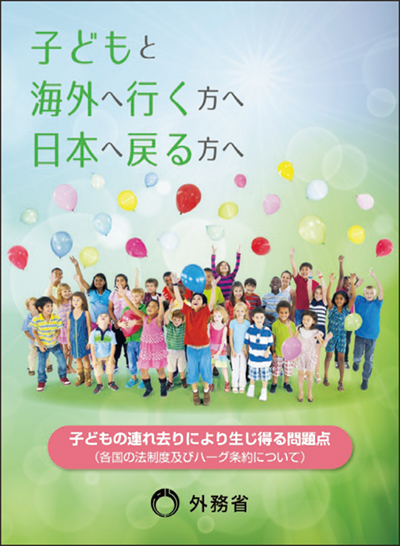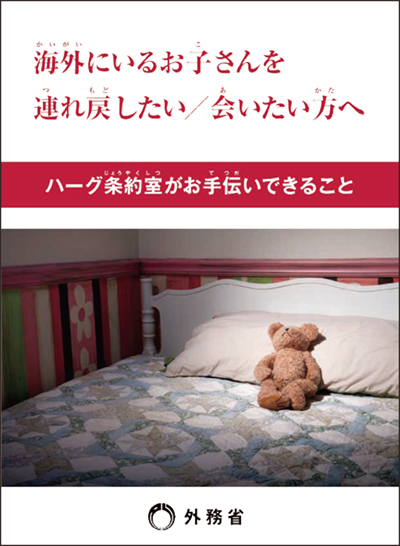Diplomatic Bluebook 2018
Chapter 4
Japan's Diplomacy Open to the Public
4 The Convention on the Civil Aspects of International Child Abduction (the Hague Convention) and its Implementation
The Hague Convention is designed as an international mechanism for addressing disputes arising from the wrongful removal or retention of children across borders in the belief that the interests of children are of paramount importance. It requires cooperation between Contracting States to the Convention for returning children to their state of habitual residence and establishing opportunities for transboundary parent-child access.
This convention came into force in Japan on April 1, 2014. Currently, 98 countries including Japan are parties to the Convention.
The convention is implemented through mutual cooperation among the governmental agencies designated as the Central Authority in Contracting States to the Convention. In Japan, MOFA as the Central Authority avails itself of experts in various fields and communicates/cooperates with foreign Central Authorities, and provides assistance to the parties such as locating whereabouts of the child and arranging mediation services aimed at amicable resolutions.
In the three years and nine months between the entry into force of the Convention and the end of December 2017, MOFA received a total number of 272 applications: 152 applications seeking the return of the child and 120 applications seeking access to the child. Of these, in 47 cases seeking the return of the child from Japan to another country, children were returned or conclusions not to return the child were reached. A conclusion was reached in 35 cases requesting the return of the child from another country to Japan.
In January and March 2017, study group meetings were hosted by the Director-General of the Consular Affairs Bureau, MOFA, in view of the three-year anniversary since the entry into force of the Convention. In these meetings experts with in-depth knowledge of the Hague Convention discussed Japan's implementation of the Convention to date and related issues. In the “Summary of Discussions” that was presented as the results of the seminars, it was evaluated that Japan has been implementing the Convention smoothly in general and also indicated points to be improved and the direction of reviews, etc. In February 2017, MOFA held the “Seminar on the Hague Convention for Diplomatic Missions in Tokyo” and in March a psychological expert with expert knowledge on children's welfare in disputes was invited to Japan from Australia to share her insight with people involved in Japan's implementation of the Hague Convention. In addition, a meeting of the Special Commission (held once every five years) took place in October in The Hague, the Netherlands, which attracted representatives from 62 countries and regions and about 290 people. Japan attended the Commission and held discussions with various countries. Furthermore, MOFA, together with the Hague Conference on Private International Law (HCCH), co-hosted the “Tokyo Seminar on the 1980 Hague Convention in Asia Pacific” in December. Frank and active discussions were held among participants from 14 countries and regions of Asia Pacific on the domestic framework required for acceding to the Convention and approaches to the proper implementation of the Convention, etc (see Column “Making the Hague Convention Widely Known: Public Relations Activities”).

The “Convention on the Civil Aspects of International Child Abduction” (hereinafter referred to as “the Hague Convention”) entered into force in Japan on April 1, 2014. The Hague Convention Division of the Consular Affairs Bureau at the Ministry of Foreign Affairs performs the role of the Central Authority of Japan under the Hague Convention. Based on the perspective that it is important to prevent children being inconsiderately removed due to a lack of awareness of the Hague Convention, the Hague Convention Division undertakes a various range of public relations activities aimed at making the Convention more widely known.
1. Seminars
The Hague Convention Division has been holding seminars nationwide for local municipalities, bar associations, the police, the immigration bureaus, the courts, domestic violence victims support groups and other entities since the Convention entered into force. In the fiscal year 2016, the Hague Convention Division explained the Hague Convention and the various types of its support to around 1,200 people in 34 locations. Furthermore, in June 2016, 64 specialists from 21 countries and regions, centering on the Asia-Pacific region were invited to the Asia Pacific Symposium on the 1980 Hague Child Abduction Convention, which was co-hosted by the Permanent Bureau of the Hague Conference on Private International Law (HCCH), Waseda University, and the Ministry of Foreign Affairs. Along with seeking to deepen the knowledge of those who are tasked with implementing the Convention and strengthen the implementation framework, the goal of the Symposium was to share the knowledge of Contracting States of the Hague Convention with non-Contracting States. In February 2017, the Seminar on the Hague Convention for Diplomatic Missions in Tokyo was held and attracted 77 participants from 59 countries, including 17 non-Contracting States. Additionally, in December, the Tokyo Seminar on the 1980 Hague Convention in Asia Pacific was held to encourage non-Contracting States in Asia to join the Convention and to promote establishing the environment for implementing the Convention for new Contracting States.
2. Leaflets
 MOFA leaflet
MOFA leaflet“To parents traveling abroad with children / To parents returning to Japan with children”
 MOFA leaflet
MOFA leaflet“For Parents Wanting to Bring Children Living Overseas Back to Japan or See Them”
The Hague Convention Division created materials that include an A4-size pamphlet using manga comics to explain the Hague Convention in an easy-to-understand manner and a palm-size leaflet presenting an overview of the Convention. These materials are distributed through domestic related organizations, embassies in Tokyo, Japanese embassies/consulates abroad, and so on. The leaflet was translated in 13 languages: Japanese, English, Italian, Korean, Cantonese, Spanish, Thai, Tagalog, German, French, Beijing dialect, Portuguese and Russian. Furthermore, in 2017, the Hague Convention Division newly created a leaflet for the parents whose children have been removed, and a poster in order to prevent the inconsiderate removal of children. In addition to these materials, it also created and broadcasted (in March 2017) an online advertisement and public-relations television program.
In this way, the Hague Convention Division has been carrying out a variety of activities in order for more people to correctly understand the Hague Convention. It will continue to endeavor to carry out broader PR activities in order to prevent wrongful child removals by one parent.

